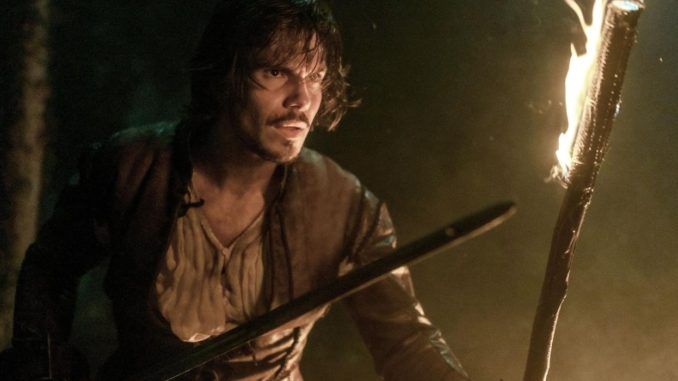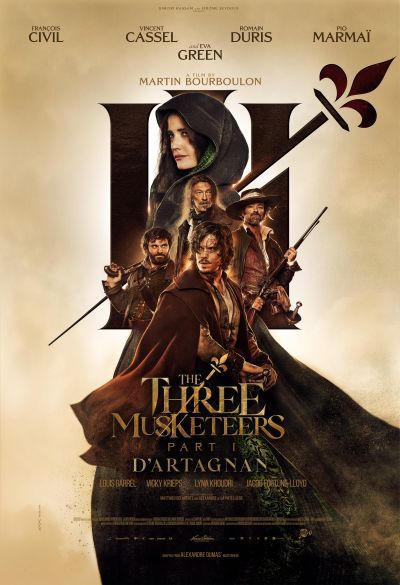
Rating: C+
Dir: Martin Bourboulon
Star: François Civil, Vincent Cassel, Eva Green, Lyna Khoudri
You know how there are books regarded as “unfilmable”? Well, The Three Musketeers may be the reverse. I tried to read Alexander Dumas’s novel once, but was simply unable to get through it. The level of description applied left the story proceeding at a glacial pace: he feels like the literary equivalent of Quentin Tarantino. I mean, on the very first page, the colour of d’Artagnan’s doublet is described as “faded into a nameless shade between lees of wine and a heavenly azure.” What was wrong with just calling it “blue”? All the movie versions I’ve seen seem to do a much better job of getting to, and then through, the sword-fights and political intrigue in pre-revolutionary France.
Let’s face it: those are why we are here, and this version does a decent enough job to make me forgive – or, at least, tolerate – the fact it follows the recent trend for splitting its story into two, all the better to shakedown the audience. What we get here is the arrival of d’Artagnan (Civil) in Paris, his becoming friends with the Musketeers, and falling for Constance Bonacieux (Khoudri), who works as an intermediary between Queen Anne and her English lover, Lord Buckingham. There’s also a lot of that intrigue, with religious tensions threatening to carve the French nation apart, Cardinal Richelieu trying to take power for himself, and his agent Milady de Winter (Green) seeking to split King Louis XIII from his queen.
 There’s nothing particularly ground-breaking about this adaptation. Bourboulon makes an effort to stage some of the action in single takes, most notably a battle in the forest between the Musketeers and Richelieu’s men. Unfortunately, the effect is spoiled by him also adopting shakicam for these sequences, which damages, rather than enhances the effect. We also don’t get a lot of insight into the trio beyond Athos (Cassel), who is framed for murder, and gets the film’s most effective speech, explaining why he’s not married. Porthos is bisexual, because it’s 2023 and someone has to be, I guess. Maybe the others will get their moments in the second installment. I also was amused by how it appears everywhere in England is within two miles of the White Cliffs of Dover.
There’s nothing particularly ground-breaking about this adaptation. Bourboulon makes an effort to stage some of the action in single takes, most notably a battle in the forest between the Musketeers and Richelieu’s men. Unfortunately, the effect is spoiled by him also adopting shakicam for these sequences, which damages, rather than enhances the effect. We also don’t get a lot of insight into the trio beyond Athos (Cassel), who is framed for murder, and gets the film’s most effective speech, explaining why he’s not married. Porthos is bisexual, because it’s 2023 and someone has to be, I guess. Maybe the others will get their moments in the second installment. I also was amused by how it appears everywhere in England is within two miles of the White Cliffs of Dover.
Despite all these criticisms, it’s generally entertaining to watch, and the production values are top-tier, with a lot of money clearly spent on this. Civil makes for a decent hero, and Green is as good value as ever. Casting her was an excellent choice, and since the second part is sub-titled “Milady,” I’m hopeful she’ll play a pivotal role there. Given Wikipedia lists some thirty film versions of the story, so I’d be hard-pushed to say where this ranks. I reviewed the Paul W.S. Anderson version, which ended up with the same adequately entertaining grade, despite – or maybe because of – containing airships. I see I complained about the novel there as well, so am at least consistent.
